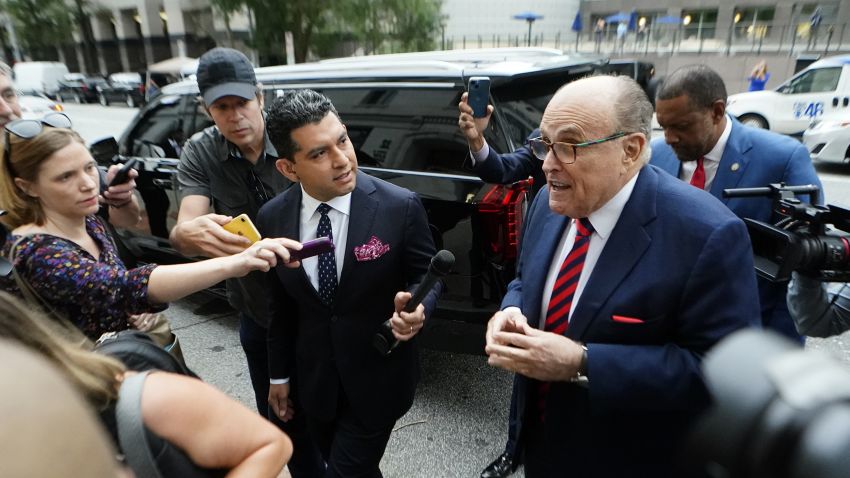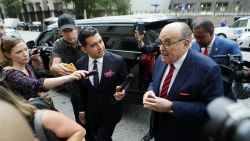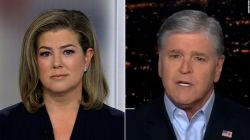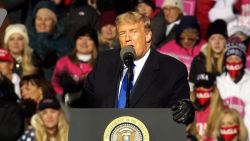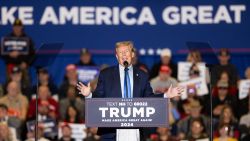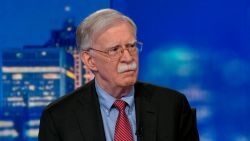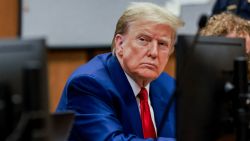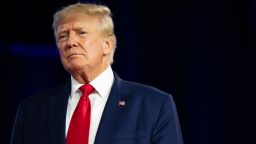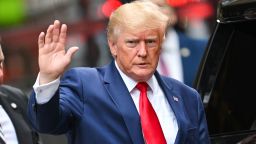Editor’s Note: Jodi Enda is a political journalist and a senior fellow at the Center for American Progress. A former White House correspondent, she was the editor in chief of ThinkProgress and an assistant managing editor at CNN, where she oversaw the 2016 election book, Unprecedented: The Election That Changed Everything. The opinions in this commentary are her own. Read more opinion at CNN.
How will we know when Rudy Giuliani hits rock bottom?
Hailed as a hero for his calm leadership following the September 11, 2001 terror attacks, Giuliani learned this week that he is a target of a criminal investigation into efforts to overturn the will of Georgia’s voters in the 2020 presidential election.

In the two-plus decades since he earned the sobriquet of “America’s Mayor,” Giuliani has been involved in so many dodgy, questionable and just-plain-weird incidents that he has become a favorite of late-night talk show hosts and Saturday Night Live impersonators.
He has become a caricature of himself, but it is Giuliani alone – not the comedians who mock him – who has turned his life into a tragicomedy.
The apex of his career is easily pinpointed to the painful autumn of 2001. But what is the nadir? Has it occurred? Or is the one-time-prosecutor-turned-attorney-to-former-President Trump still falling?
History is replete with tragic figures (most of them men) who squandered their power or fame or good reputations. There were Aaron Burr, Benedict Arnold (whose very name became a slur), Jefferson Davis and Robert E. Lee. More recently, we had former President Richard Nixon and non-political figures like O.J. Simpson, Harvey Weinstein and Bill Cosby, to name but a few. Some would add Donald Trump, but his story is for another day.
Giuliani had much to lose when he hitched his wagon to Trump’s star. The power of his mayoralty was over, but he still had a commanding presence in the city he once led. His business dealings brought him wealth; his reputation was smudged but not tattered. Not yet, anyway.
On Wednesday, Giuliani testified for about six hours before a Fulton County, Georgia, special grand jury investigating Team Trump’s efforts to overturn President Joe Biden’s victory in that state. Though his lawyer declined to discuss the content of his testimony, his very appearance in an Atlanta courtroom makes Giuliani the highest profile member of Trump’s inner circle to testify in an election-fraud investigation to date.
Giuliani told Georgia lawmakers in December 2020 that he had evidence of voter fraud, claims that the state’s Republican election officials proved false. That he now is a target of the investigation means the former federal prosecutor could be indicted. That would definitely be his lowest point. At least, so far.
But, of course, that might not be the end of his legal troubles. And it certainly isn’t the beginning.
Last year, a New York appellate court temporarily suspended Giuliani’s law license in response to the false election fraud claims he made in Georgia and a number of other states. Washington, DC, followed suit. He and another Trump lawyer, Sidney Powell, are among those being sued by Dominion Voting Systems for falsely claiming the company rigged voting machines to help secure a Biden victory.
In a bit of good news for Giuliani, it appears he is unlikely to be charged in a federal investigation into whether he illegally lobbied the Trump administration to remove the then-US ambassador to Ukraine, according to The New York Times. The ambassador, Maria L. Yovanovitch, figured heavily in Trump’s first impeachment trial.
Still, his ongoing legal troubles represent a stunning fall from grace for a former US attorney who made his name battling corrupt politicians, mob bosses and Wall Street titans, a mayor who led the nation’s biggest city through some of its darkest days. In fact, the phrase “fall from grace” is a phrase often found in stories about the trajectory of Giuliani’s career.
Even when Giuliani was a respected officeholder, controversy swirled around him. In the fall of 1992, shortly before he ran for mayor, Giuliani was a provocateur in one of New York’s largest riots, when more than 10,000 demonstrators, many of them off-duty police officers, blocked traffic and stormed City Hall while uniformed police stood idly by. The rioters were mostly White, and they were protesting the city’s first Black mayor, David Dinkins.
During his two terms in office, violent crime dropped precipitously, as it did in a number of big cities in the 1990s. Giuliani became known for cracking down on squeegee men, shuttering X-rated theaters and essentially making New York safer and more livable for the mostly White people who gentrified Manhattan and populated working-class neighborhoods of other boroughs. The phrase “Giuliani time” became a common refrain among those who were well served by the mayor.
It was a bleak time, however, for unhoused people and people of color, particularly Black and Latino youths who often were subjected to stop-and-frisk searches, which years later were declared unconstitutional.
Giuliani’s legacy was marred further by repeated, heinous incidents of police brutality against Black men. Two police officers were convicted after violently sodomizing Haitian immigrant Abner Louima with a toilet plunger. (One conviction was later overturned.) Four were acquitted after killing Amadou Diallo, an unarmed immigrant from Guinea, who was shot 41 times while standing in the doorway of his apartment building. To many New Yorkers, the episodes confirmed that racism permeated the government and, equally important, that the mayor appeared to be indifferent to it.
Was turning a blind eye to police brutality towards Black people rock bottom?
Giuliani also was involved in his share of buffoonery, such as a 2000 comedy skit in which he dressed in drag and then-businessman Donald Trump thrust his face into the mayor’s bosom. That was pretty low, but probably not rock bottom.
Then came 9/11. Giuliani was President George W. Bush’s guide to the rubble of the Twin Towers, a paternal figure who declared that New York would rebuild and “come out of this stronger than we were before.”
Oprah Winfrey called him “America’s Mayor.” Time magazine made him person of the year. It took a national tragedy, but Giuliani met the moment and reached the pinnacle of his success. And he was right: New York would rebuild, but primarily under Giuliani’s successor, Michael Bloomberg, who took office Jan. 1, 2002.
Sometime after the accolades waned, Giuliani’s slide began. There were two contentious divorces, one of which he announced publicly before telling his wife. (His first marriage ended in annulment after 14 years on the grounds the couple were second cousins.) There was a short-lived 2008 presidential run (in which he once answered his third wife’s call during a campaign speech) and an aborted 2020 Senate race. There was a lucrative business that came under scrutiny for representing Purdue Pharma, the maker of OxyContin and later for work involving Ukraine.
Bumps in the road, but not rock bottom.
Giuliani returned to the public sphere in 2016, when he joined the Trump campaign and played an outsize role. “I’m not so sure Trump’s president without Rudy,” former campaign CEO Steve Bannon told Rolling Stone. After the Access Hollywood tape was made public (something many people thought would be Trump’s low point), Giuliani routinely volunteered to go on news shows to defend him. Giuliani wanted to be secretary of state in return, but that never came to pass.
Instead, Giuliani became Trump’s personal lawyer and co-conspiracy theorist. During the 2016 election, he tried to spread the false rumor that Hillary Clinton was ill. In 2020, he posited that China purposefully released the coronavirus.
But the biggest, most virulent whoppers of them all were Giuliani’s contentions, repeatedly debunked, that widespread election fraud cost Trump his job. The election lies promoted by Trump, Giuliani and others, grew bigger and wilder as time went on. Ultimately, they provoked Trump loyalists to travel to Washington on January 6, 2021, the day Congress was set to certify Biden’s election.
That day, Giuliani told thousands of Trump supporters gathered on the Ellipse that Vice President Mike Pence, who would oversee the certification, had the authority to send the election back to the states. That was false. He then stood by while Trump exhorted his followers to march to the Capitol.
People died. Democracy hung in the balance. Rock bottom?
Of course, as any Giuliani-watcher knows, he also has had less serious (some would say laugh-out-loud) low points. For instance, there was the time he stuck his hands down his pants in a Borat movie. Or the time he shaved his face in an airport restaurant. There was that bizarre, conspiracy-theory-laden press conference in the parking lot of Four Seasons Total Landscaping in Philadelphia.
Perhaps the most embarrassing Giuliani moment occurred when a dark liquid that appeared to be hair dye dripped down his face during a news conference intended to call attention to (non-existent) voter fraud. Great late-night fodder, but probably not rock bottom.
But now things are serious for the wide-eyed former mayor. Now there could be legal consequences in Georgia and possibly elsewhere.
Perhaps Giuliani has finally hit rock bottom. Or perhaps one of the myriad investigations of election fraud will lead to a new low. Criminal charges, imprisonment, a lifetime of ignominy? It’s hard to know just how far from “hero” Giuliani might fall.
